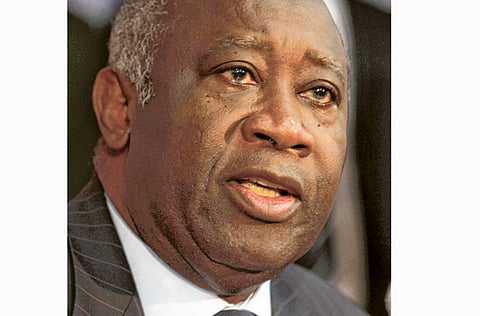Ivory Coast leader sworn in despite UN insisting his opponent won
Vote was meant to restore stability but has increased violent unrest

Abidjan, Ivory Coast: President Laurent Gbagbo was sworn in for a new term on Saturday even though the United Nations and world leaders maintain his opponent won the disputed election, which was the West African nation's first since a civil war.
In a bold sign Gbagbo would not bow to international pressure to concede defeat, he wrapped himself in the Ivorian flag as he took the oath at the presidential palace.
Overturn results
The ceremony came only a day after one of Gbagbo's allies went on state television to overturn previously announced results that showed opposition leader Alassane Ouattara had won.
US President Barack Obama and French President Nicolas Sarkozy say Ouattara's victory must be acknowledged. The top UN official in Ivory Coast is also standing by the earlier results putting Ouattara ahead.
"The international community will hold those who act to thwart the democratic process and the will of the electorate accountable for their actions," Obama warned.
European Commission President Jose Manuel Barroso yesterday also described Ouattara as "the legitimate winner" of the runoff vote nearly a week ago.
"I am deeply concerned by the evolution of events in Ivory Coast," Barroso said.
"I call on all political forces to respect the electoral outcome, to show responsibility and to refrain from any act of violence."
Ivory Coast's presidential election was meant to restore stability after a brief 2002-2003 civil war destroyed the economy of one of the most affluent countries in Africa. Instead, the election is casting a growing shadow with Gbagbo holding the inauguration ceremony even as international pressure mounts.
Protest
Friday's announcement sparked violent protests in Ivory Coast's main city, Abidjan, yesterday, Ouattara supporters once again took to the streets, burning tyres and a table in one neighbourhood.
Gbagbo's five-year mandate expired in 2005 and the country's first election in a decade was delayed multiple times.


